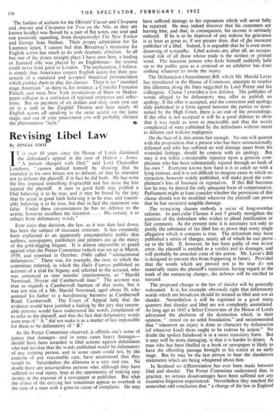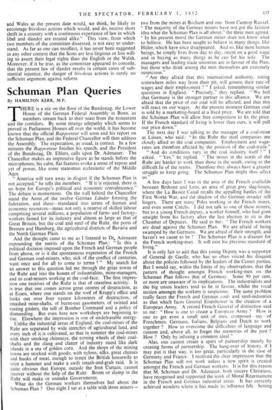Revising Libel Law
By DINGLE FOOT
IT is over 40 years since the House of Lords dismissed the defendant's appeal in the case of H,,/ton v. Jones. "A person charged with libel," said Lord Chancellor Loreburn, "cannot defend himself by showing that he intended in his own breast not to defame, or that he intended not to defame the plaintiff, if in fact he did both. He has none the less imputed something disgraceful and has none the less injured the plaintiff. A man in good faith may publish a libel believing it to be true, and it may be found by the jury that he acted in good faith believing it to be true, and reason- ably believing it to be true, but that in fact the statement was false. Under these circumstances .he has no defence to the action, however excellent the intention . . . His remedy is to refrain from defamatory words."
Ever since that decision, the law, as it was then laid down, has been the subject of incessant criticism. It has constantly been explained to an apparently unsympathetic public that authors, newspapers, publishers and printers are at the mercy of the gold-digging litigant. It is almost impossible to guard against what the Porter Committee (which was set up in March, 1939, and reported in October, 1948) called "unintentional defamation." There was, for example, the case, to which the committee referred, in which the Daily Express published an account of a trial for bigamy and referred to the accused, who was sentenced to nine months' imprisonment, as "Harold Newstead, 30-year old Camberwell man." The account was true as regards a Camberwell barman of that name, but it was not true of a Mr. Harold Newstead, aged about 30, who assisted his father in a hairdressing business at Camberwell Road, Camberwell. The Court of- Appeal held, that the evidence would have justified a finding by the jury that reason- able persons would have understood the words complained of to refer to the plaintiff, and that the fact that defamatory words were true of " A "did not make it as a matter of law impossible for them to be defamatory of "B."
As the Porfer Committee observed, it offends one's sense of justice that damages—and in some -cases heavy damages— should have been awarded in libel actions against defendants who had no idea that the words published would be defamatory of any existing person, and in some cases could not, by the exercise of any reasonable care, have ascertained that they would be. Nevertheless the dilemma is a very real one. No doubt there are unscrupulous persons who, although they have suffered no real injury, leap at the opportunity of making easy money at the expense of a newspaper or publisher. But what the critics of the exiting law sometimes appear to overlook is the case of a man with a genuine cause of complaint. He may have suffered damage to his reputation which will never fully be repaired. He may indeed discover that his customers are leaving him, and that, in consequence, his income is seriously reduced. If he is to be deprived of any redress his grievance is at least as great as, if not greater than, that of the innocent publisher of a libel. Indeed, it is arguable that he is even more deserving of sympathy. Libel actions are, after all, an occupa- tional risk of all those whose trade is the written or printed word. The innocent person who finds himself suddenly held up to the public gaze as a criminal or an adulterer has'done nothing whatever to Invite the injury.
The Defamation (Amendment) Bill, which Mr. Harold Lever has introduced in the House of Commons, attempts to resolve this dilemma along the lines suggested by Lord Porter and his colleagues. Clause 3 provides a new defence. The publisher of words alleged to be defamatory may offer to publish an apology. If the offer is accepted, and the correction and apology duly published in a form agreed between the parties or deter- mined by the High Court, there is an end of the proceedings. If the offer is not accepted it will be a good defence to show that it was made as soon as practicable and that the words complained of were published by the defendants without intent to defame anzi w:thout negligence.
On the face of it, this seems fair enough. No one will quarrel with the proposition that a person who has been unintentionally defamed and who has suffered no real damage apart from his wounded feelings, should be content with an apology. But may it not inflict considerable injustice upon a genuine com- plainant who has been substantially injured through no fault of his own ? Everyone knows how hard it is to catch up with a lying rumour, and it is not difficult to imagine cases in which no retraction, however widely published, will make good the com- plainant's loss of business or reputation. If this Bill becomes law he may be denied the only adequate form of compensation. Parliament might at least consider whether the provisions of this clause should not be modified wherever the plaintiff can prove that he has sustained tangible damage.
The remaining clauses embody a series of long-overdue reforms. In particular Clauses 4 and 5 greatly strengthen the position of the defendant who wishes to plead justification or fair comment. At the present time it is necessary not only to justify the substance of the libel but to prove that every single allegation which it contains is true. The defendant may have published a series of charges, nearly all of which he can prove up to the hilt. If, however, he has been guilty of one m:nor error, the plaintiff is entitled to a verdict and to damages, and will probably be awarded costs of the action. Mr. Lever's Bill is designed to prevent this from happening in future. Provided that the words which are proved, not to be true do not materially injure the plaintiff's reputation, having regard to the truth of the remaining charges, the defence will be entitled to succeed.
The proposed change in the law of slander will be generally welcomed. It is, for example, obviously right that defamatory words which are broadcast should be treated as libel and not as slander. Nevertheless it will be regretted in a good many quarters that slander and libel are not completely assimilated. As long ago as 1843 a Select Committee of the House of Lords advocated the abolition of the distinction which, in their opinion," rested on no solid foundation," and recommended that-" whenever an injury is done to character by defamation (of whatever kind) there ought to be redress by action." No doubt the spoken falsehood is in a more transitory form. But it may well be more damaging, in that it is harder to detect. A man who has been libelled in a book or newspaper is likely to have the offending passage brought to his notice at an early stage. But he may be the last person to hear the slanderous statements which are being whispered about him.
• In Scotland no differentiation has ever been made between libel and slander. The Porter Committee understood that, in practice, no serious disadvantages have been suffered nor any excessive litigation experienced. Nevertheless they reached the somewhat odd conclusion that" a change of the law in England and Wales at the present date would, we think, be likely to encourage frivolous actions which would, and do, receive short shrift in a country with a continuous experience of law in which libel and slander are treated alike." This view, from which two members of the committee dissented, is not easy to under- stand. As far as one can recollect, it has never been suggested in any other context that the Scots are less litigious or less will- ing to assert their legal rights than the English or the Welsh. Moreover, if it be true, as the committee appeared to concede, that the present law of slander results in certain cases of sub- stantial injustice, the danger of frivolous actions is surely no sufficient argument against reform.



































 Previous page
Previous page